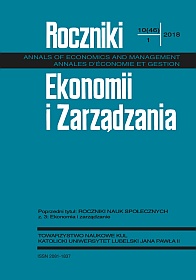Family 500+ Program – Success or Failure?
Abstract
The article is based on two-year observations, field studies and analysis of existing data, published by the Central Statistical Office and the Ministry of Family, Labour and Social Policy. The information obtained allowed to determine the effectiveness of the program from the perspective of both the state and beneficiaries of aid funds. Its aim is to make people aware that what looks good at first glance may bring irreversible negative effects in the long term. This article aims to show how important for the next generations is a thorough analysis of the effects of actions taken by decision-makers. The essence of the article is to emphasize the importance of the distribution channel for assistance funds and to try to answer the following questions: Is the introduction of the Family 500+ program capable of contributing to the alleviation of the already observable effects of the demographic decline? In the long-term perspective, does the program stand a chance of success and implementation of the ministerial assumptions? The Family 500+ program is an innovative state initiative aimed at initiating the process of mitigating the effects of the demographic crisis in Poland, and at the same time reducing poverty among children.
References
Brandt N., Kiełczewska A., Magda I., The Family 500+ Child Allowance and Female Labour Supply in Poland, IBS Working Paper, Warszawa 2018.
Brzeziński M., Bezpieczeństwo społeczne jako rodzaj bezpieczeństwa. Ustalenia wprowadzające, w: Bezpieczeństwo społeczne. Pojęcia, uwarunkowania, wyzwania, red. A. Skrabacz, S. Sulowski, Warszawa 2012.
Konstytucja Rzeczypospolitej Polskiej z dnia 2 kwietnia 1997 r.
Malec M., Percepcja bezpieczeństwa: definicje, wymiary i paradygmaty, Warszawa 2006.
Copyright (c) 2018 Roczniki Ekonomii i Zarządzania

This work is licensed under a Creative Commons Attribution-NonCommercial-NoDerivatives 4.0 International License.


